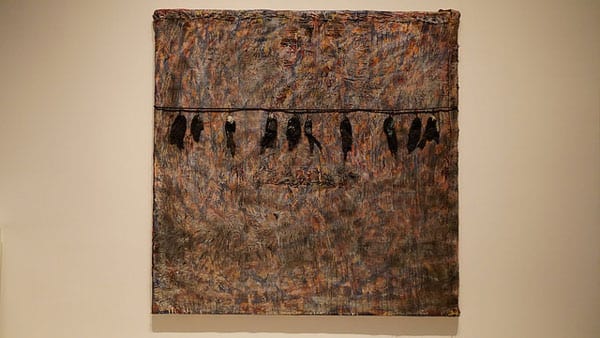
November 12, 2018; New York Times
NPQ has for some time been following trends that reflect a lack of diversity in US art museums, as well as the many initiatives being developed by individual institutions and funders to reconfigure the museum landscape. These efforts include diversifying the artists represented, diversifying the executives and curators who oversee collections and exhibitions, and even diversifying the trustees who serve on the boards of nonprofits arts groups.
For far too long, this has been a game of catch-up for the museum sector. And while no one program or funding organization can undo centuries of exclusion, the Atlanta-based Souls Grown Deep Foundation is taking giant steps to correct for a still-pervasive lack of Black American artists in US museums. The foundation recently announced it will help five museums to acquire paintings, sculptures, and works on paper by “self-taught African American artists of the South,” as reported in the New York Times.
The museums are the Brooklyn Museum and the Morgan Library & Museum in New York, the Spelman College Museum of Fine Art in Atlanta, the Dallas Museum of Art, and the Museum of Fine Arts in Boston. Collectively, these institutions will be adding 51 objects by 30 artists to their collections. The new acquisitions, currently in the collection of the Souls Grown Deep Foundation, are valued at $1.6 million, but the museums are paying the foundation only $455,000 in total for the works.
Sign up for our free newsletters
Subscribe to NPQ's newsletters to have our top stories delivered directly to your inbox.
By signing up, you agree to our privacy policy and terms of use, and to receive messages from NPQ and our partners.
This transfer of art will increase the foundation’s impact to a total of 12 high-profile museums, delivered through a combination of gifts and purchases. Other institutions that have previously received work through this program include the Metropolitan Museum of Art in New York, the High Museum of Art in Atlanta, and the Fine Arts Museums of San Francisco.
The foundation’s website describes the work of the organization as “documenting, preserving, and promoting the contributions of artists from the African American South, and the cultural traditions in which they are rooted.” The Times article characterizes the transfer of artworks to museums across the country as “a strategic effort to reshape the narrative of American art.”
The Souls Grown Deep collection, which numbered about 1,300 pieces before the foundation began to transfer works to museums, was initially assembled beginning in the 1980s by William Arnett. Foundation president Maxwell Anderson has, since 2016, been reaching out to museum leaders to discuss adding works from this collection to their institutions. Proceeds from sales of the art to museums do not only advance the visibility of Black artists, ensure that collections better reflect the makeup of the US population, and help people of color feel more welcome in museums; they also generate new funds for the foundation, which has to date established two new grants programs:
- Beginning in 2019, Souls Grown Deep will fund three paid museum internships for undergraduate students of color at three institutions that already have acquired work from the foundation—the New Orleans Museum of Art, the Philadelphia Museum of Art, and the Virginia Museum of Fine Arts. This program is expected to expand in the future.
- Among the best known self-taught Black artists of the South are the women behind the Gee’s Bend quilts, works of homemade art that have toured extensively and have been celebrated for their extraordinary craftsmanship. However, the makers of these quilts, who still live in an “impoverished Alabama county,” have seen very little financial benefit from their art. Souls Grown Deep plans to direct future grants to community improvements there and to help these women sell their art.
Again, no one funder or individual art museum can wave a magic wand and make collections far and wide as inclusive as they ought to be. And to be clear, the projects described here focus on a subset of African American artists, and not on all underrepresented artists of color. Still, by working together, it’s possible that the Souls Grown Deep Foundation and the museums it partners with might create enough momentum to have a profound impact across the museum sector.—Eileen Cunniffe













